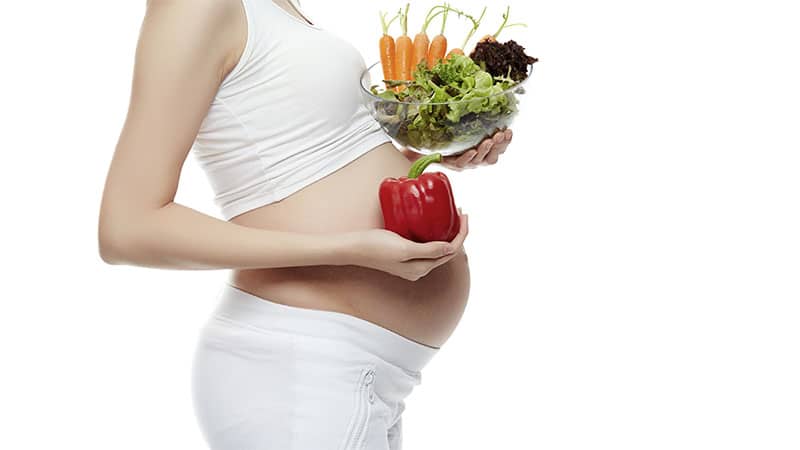There’s a lot of responsibility when you are eating for two! Every mother wants to ensure she has a healthy diet when pregnant – as well as avoiding foods which can impact an unborn baby. The team from Bupa Global answers our questions about healthy eating during pregnancy – what are the best foods to eat – and which ones to avoid.
What’s the best diet for a healthy pregnancy?
There isn’t a special diet for when you’re pregnant. The most important thing is to follow a normal healthy diet that gives you enough energy and nutrients for your baby to grow and develop.
That includes:
- basing meals on starchy foods (wholegrain when you can);
- plenty of fruit and veg;
- some protein such as lean meat, fish, eggs or pulses every day;
- some dairy products or calcium enriched alternatives every day;
- choosing unsaturated oils and spreads, and eating them in small amounts;
- six to eight cups of fluid a day;
- limiting fat and sugar;
- maximising the nutrients important for pregnancy.

Should I take supplements while pregnant?
It’s recommended you take folic acid and vitamin D supplements as you need more of these during pregnancy, and it’s hard to get enough from other sources. A folic acid supplement during early pregnancy can reduce the risk of neural tube defects in babies such as spina bifida. Vitamin D is important for healthy bones; your baby will need a good supply of it to grow and develop.
Avoid any supplement that contains vitamin A (retinol); large amounts of vitamin A can be harmful to your unborn baby.
Your body needs iron to ensure your growing baby has a sufficient blood supply. Most women get enough iron from their diet, but your GP or midwife may recommend a supplement if your levels are low.
Any foods to avoid eating during pregnancy?
Certain foods aren’t safe to eat when you’re pregnant because they can contain harmful bacteria such as listeria, are a source of salmonella or toxoplasmosis, or contain high levels of vitamin A.
These include:
- mould-ripened soft cheeses such as camembert, brie and blue cheese;
- unpasteurised milk and milk products;
- raw or partially cooked meat, and cured, uncooked meats such as prosciutto and salami;
- pâté, including the vegetable kind;
- raw shellfish; • shark, swordfish and marlin (which can contain mercury);
- foods with soil on them – such as salads, fruit and vegetables (wash them thoroughly before use).
The current advice is not to drink alcohol at all if you’re pregnant. If you drank before finding out you’re pregnant, the risk your baby will be affected is likely to be low, but avoid further drinking. Try decaffeinated teas and coffees and other alternatives to tea, coffee, colas and energy drinks that contain caffeine.
Do I need to eat more when I’m pregnant?
Although you may feel more hungry than usual when pregnant, there’s no need to “eat for two”. It’s only when you reach the last three months that you may need extra energy – around 200 extra calories a day (roughly the same as two slices of bread). Putting on too much weight can increase your risk of developing complications during your pregnancy, such as diabetes and high blood pressure, and can also increase the risk of health problems for your baby.
Are vegetarian and vegan diets okay during pregnancy?
Being vegetarian or vegan shouldn’t pose a problem when you’re pregnant – as long as you eat a healthy balanced diet. For example, you can get protein you’re missing in meat from eggs, soya, beans, nuts and pulses; tofu is another good source. To increase iron intake, eat lots of green leafy vegetables, along with peas, lentils, nuts and seeds.
If you’re vegan and don’t eat any food from animal sources, be sure to get enough calcium and vitamin B12. Bread, cereals and dairy-free alternatives are often fortified with these nutrients, so check food labels before you buy.
This article was brought to you by Bupa Global.
bupaglobal.com | 2531 8562 | globalplanhk@bupa.com
Disclaimer: This article was designed and produced by Bupa Global by searching internal and external data and information for information provision and reference purposes only. Any views or information mentioned and set out in this article/webpage are based on general situations. Readers should not regard them as medical advices or medical recommendations. Before making any decisions about the theme of this article, you are recommended to seek independent advice from suitable professionals (such as doctors, nutritionists, etc.). It is clearly stated that Bupa Global will not bear any responsibilities for others’ usage or interpretation of the information listed in this article. When preparing and/or updating this article, Bupa Global endeavours to ensure that the content is accurate, complete and updated but will not bear any responsibilities nor make any warranty or guarantee for the accuracy, completeness and timeliness of the information or for any claims and/or losses caused thereby.
Like this? See more helpful tips in our Health & Fitness section.
Subscribe to Expat Living magazine now so you never miss an issue!





